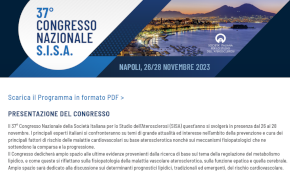 Rivista in lingua italiana
Rivista in lingua italiana
riservata ai Soci SISA
Ultimo numero:
Anno 14 • N.4/2023
Abstract
Cardiovascular Efficacy and Safety of Bococizumab in High-Risk Patients
Ridker PM, Revkin J, Amarenco P, Brunell R, Curto M, Civeira F, Flather M, Glynn RJ, Gregoire J, Jukema JW, Karpov Y, Kastelein JJ, Koenig W, Lorenzatti A, Manga P, Masiukiewicz U, Miller M, Mosterd A, Murin J, Nicolau JC, Nissen S, Ponikowski P, Santos RD, Schwartz PF, Soran H, White H, Wright RS, Vrablik M, Yunis C, Shear CL, Tardif JC; SPIRE Cardiovascular Outcome Investigators
N Engl J Med. [Epub ahead of print]
Background Bococizumab is a humanized monoclonal antibody that inhibits proprotein convertase subtilisin-kexin type 9 (PCSK9) and reduces levels of low-density lipoprotein (LDL) cholesterol. We sought to evaluate the efficacy of bococizumab in patients at high cardiovascular risk.
Methods In two parallel, multinational trials with different entry criteria for LDL cholesterol levels, we randomly assigned the 27,438 patients in the combined trials to receive bococizumab (at a dose of 150 mg) subcutaneously every 2 weeks or placebo. The primary end point was nonfatal myocardial infarction, nonfatal stroke, hospitalization for unstable angina requiring urgent revascularization, or cardiovascular death; 93% of the patients were receiving statin therapy at baseline. The trials were stopped early after the sponsor elected to discontinue the development of bococizumab owing in part to the development of high rates of antidrug antibodies, as seen in data from other studies in the program. The median follow-up was 10 months.
Results At 14 weeks, patients in the combined trials had a mean change from baseline in LDL cholesterol levels of -56.0% in the bococizumab group and +2.9% in the placebo group, for a between-group difference of -59.0 percentage points (P<0.001) and a median reduction from baseline of 64.2% (P<0.001). In the lower-risk, shorter-duration trial (in which the patients had a baseline LDL cholesterol level of =70 mg per deciliter [1.8 mmol per liter] and the median follow-up was 7 months), major cardiovascular events occurred in 173 patients each in the bococizumab group and the placebo group (hazard ratio, 0.99; 95% confidence interval [CI], 0.80 to 1.22; P=0.94). In the higher-risk, longer-duration trial (in which the patients had a baseline LDL cholesterol level of =100 mg per deciliter [2.6 mmol per liter] and the median follow-up was 12 months), major cardiovascular events occurred in 179 and 224 patients, respectively (hazard ratio, 0.79; 95% CI, 0.65 to 0.97; P=0.02). The hazard ratio for the primary end point in the combined trials was 0.88 (95% CI, 0.76 to 1.02; P=0.08). Injection-site reactions were more common in the bococizumab group than in the placebo group (10.4% vs. 1.3%, P<0.001).
Conclusions In two randomized trials comparing the PCSK9 inhibitor bococizumab with placebo, bococizumab had no benefit with respect to major adverse cardiovascular events in the trial involving lower-risk patients but did have a significant benefit in the trial involving higher-risk patients.
N Engl J Med. [Epub ahead of print]

Area Soci
Eventi



 SISA LIPID ACADEMY - Corso avanzato di lipidologia clinica
SISA LIPID ACADEMY - Corso avanzato di lipidologia clinicaModena, 22-23 Giugno 2023
[continua a leggere]Giornale Italiano Arteriosclerosi
HoFH today
 Rivista Italiana della
Rivista Italiana della
Ipercolesterolemia
Familiare Omozigote
Anno 5 • N.1/2023
Rivista NMCD
Diateca
[continua a leggere]
[continua a leggere]
Newsletter
il vostro indirizzo di posta elettronica
Progetto LIPIGEN

Nuovo sito dedicato al Progetto LIPIGEN
Progetto LIPIGEN - Vecchio portale
E' necessario essere loggati come utente
Lipigen per poter accedere alla pagina
PROject Statin Intolerance SISA
PROSISA – PROject Statin Intolerance SISA
E' necessario essere loggati come utente
PROSISA per poter accedere alla pagina
GILA - Lipoprotein Aferesi
Gruppo Interdisciplinare Lipoprotein Aferesi
(Accesso Gruppo GILA-Lipoprotein Aferesi)
E' necessario essere loggati come utente del Gruppo GILA per poter accedere
Gruppo Interdisciplinare Lipoprotein Aferesi
(Documentazione ad accesso libero)
Pagina informativa per medici e pazienti








